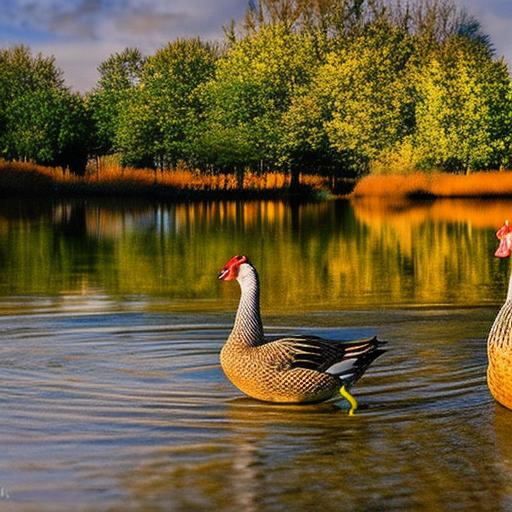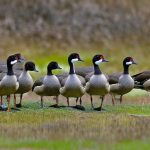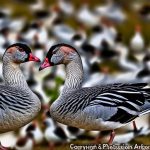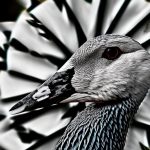Raising poultry can be a rewarding and fulfilling experience. Not only do chickens, ducks, and geese provide fresh eggs and meat, but they also offer companionship and entertainment. Keeping these three types of poultry together can have numerous benefits for both the animals and the owner.
One of the joys of raising poultry is the daily interaction with these fascinating creatures. Chickens, ducks, and geese each have their own unique personalities and behaviors that make them interesting to observe. From watching chickens scratch and peck in the dirt to seeing ducks splash around in a pond, there is never a dull moment when raising poultry.
Keeping chickens, ducks, and geese together also has practical benefits. These three types of poultry have different foraging habits, which means they can help keep your yard or garden free from pests. Chickens are excellent at scratching and eating insects, while ducks are great at controlling slugs and snails. Geese, on the other hand, are known for their ability to deter predators with their loud honking.
Key Takeaways
- Raising chickens, ducks, and geese together has many benefits, including improved soil health and pest control.
- Each type of poultry has different housing, feeding, and watering requirements that must be met for optimal health.
- Choosing compatible breeds with similar temperaments is important for a harmonious mixed flock.
- Creating a safe and secure environment is crucial to protect poultry from predators and other threats.
- Providing enough space for chickens, ducks, and geese to roam is essential for their well-being.
Understanding the Different Needs of Chickens, Ducks, and Geese: Housing, Feeding, and Watering Requirements
When it comes to housing, chickens, ducks, and geese have different requirements. Chickens need a secure coop with nesting boxes for laying eggs and roosting bars for sleeping. Ducks prefer a sheltered area with access to water for swimming and preening. Geese need a large open space with access to water for swimming and grazing.
Feeding and watering requirements also vary between chickens, ducks, and geese. Chickens require a balanced diet of grains, protein, fruits, and vegetables. Ducks need a diet that includes both dry feed and fresh greens. Geese have a similar diet to ducks but require more grass or pasture to graze on.
Choosing the Right Breeds: Compatibility and Temperament of Chickens, Ducks, and Geese
Choosing compatible breeds is crucial when keeping chickens, ducks, and geese together. Some breeds of chickens are more aggressive and may not get along well with ducks or geese. It is important to choose breeds that have a similar temperament and are known to be docile and friendly.
Understanding the temperament of chickens, ducks, and geese is also important for maintaining a harmonious flock. Chickens are social animals that thrive in groups, but they can also be territorial and may peck at other birds. Ducks are generally more laid-back and get along well with other poultry. Geese are known for their protective nature and may become aggressive towards other birds if they feel threatened.
Creating a Safe and Secure Environment: Predators and Other Threats to Poultry
Keeping poultry safe from predators is essential for their well-being. Common predators include raccoons, foxes, coyotes, and birds of prey. It is important to secure the coop and run with sturdy fencing and wire mesh to prevent predators from gaining access.
Other threats to poultry include extreme weather conditions, such as heatwaves or cold snaps. Providing adequate shelter and ventilation is crucial for protecting chickens, ducks, and geese from these weather-related dangers.
The Importance of Space: How Much Room Do Chickens, Ducks, and Geese Need to Roam?
Providing enough space for your flock is essential for their health and well-being. Chickens need at least 4 square feet of space per bird in the coop and 10 square feet per bird in the run. Ducks require more space than chickens due to their larger size and need at least 10 square feet per bird in the coop and 20 square feet per bird in the run. Geese need even more space and should have at least 20 square feet per bird in the coop and 40 square feet per bird in the run.
Having enough space allows poultry to exercise, forage, and exhibit natural behaviors. It also helps prevent overcrowding, which can lead to stress, aggression, and the spread of diseases.
Maintaining Hygiene and Health: Preventing Disease and Parasites in Mixed Poultry Flocks

Maintaining hygiene is crucial for preventing diseases and parasites in mixed poultry flocks. Regularly cleaning the coop and run, removing droppings, and providing fresh bedding can help reduce the risk of infections. It is also important to provide clean water and feed to prevent contamination.
Common diseases in mixed poultry flocks include respiratory infections, coccidiosis, and avian influenza. Parasites such as mites, lice, and worms can also affect chickens, ducks, and geese. Regular health checks, vaccinations, and deworming can help prevent these issues.
Feeding Your Flock: The Best Foods and Supplements for Chickens, Ducks, and Geese
A balanced diet is essential for the health of your flock. Chickens, ducks, and geese require a combination of grains, protein, fruits, vegetables, and supplements to meet their nutritional needs.
Commercial poultry feed is available for all three types of poultry and provides a balanced diet. Supplementing their diet with fresh greens, fruits, and vegetables can also provide additional nutrients. Calcium supplements are important for laying hens to ensure strong eggshells.
The Benefits of a Mixed Poultry Flock: Improved Soil Health and Pest Control
Keeping chickens, ducks, and geese together can have numerous benefits for your garden or yard. Their foraging habits help improve soil health by aerating the ground and adding nutrients through their droppings. They also help control pests by eating insects, slugs, snails, and other unwanted creatures.
The manure produced by chickens, ducks, and geese is also a valuable source of fertilizer. It can be composted and used to enrich the soil in your garden, reducing the need for chemical fertilizers.
Socializing Your Flock: Encouraging Positive Interactions between Chickens, Ducks, and Geese
Socializing your flock is important for their well-being and can help prevent aggression and bullying. Introducing new birds gradually and providing enough space for each bird to establish their territory can help reduce conflicts. Providing multiple feeding and watering stations can also prevent competition and aggression.
It is also important to observe the flock regularly and intervene if any bird is being excessively aggressive or bullied. Separating the birds temporarily or providing additional resources can help resolve conflicts.
Tips for Successfully Keeping Chickens, Ducks, and Geese Together
Keeping chickens, ducks, and geese together can be a rewarding experience. By understanding their different needs, choosing compatible breeds, creating a safe environment, providing enough space, maintaining hygiene and health, feeding them a balanced diet, and socializing the flock, you can successfully raise a mixed poultry flock.
The benefits of keeping chickens, ducks, and geese together include companionship, fresh eggs and meat, improved soil health, pest control, and entertainment. With proper care and attention, your mixed poultry flock can thrive and provide you with years of enjoyment.
If you’re interested in keeping chickens, ducks, and geese together, you may find this article on Poultry Wizard helpful. It provides valuable insights on how to turn a shed into a chicken coop, which can be a great solution for housing multiple poultry species. By utilizing the space efficiently, you can create a harmonious environment for your feathered friends. To learn more about this topic, check out the article here. Additionally, if you’re specifically interested in caring for goslings, Poultry Wizard offers another informative article on how to care for them. You can find it here. Lastly, if you’re looking for some creative ideas to enhance your chicken coop, don’t miss the article on the chicken coop trampoline, which can provide entertainment and exercise for your flock. Read more about it here.
FAQs
What are the benefits of keeping chickens, ducks, and geese together?
Keeping chickens, ducks, and geese together can provide a variety of benefits, including pest control, increased egg production, and a more diverse and interesting backyard flock.
What are some important considerations when keeping these birds together?
It is important to ensure that all birds have access to appropriate food and water sources, as well as adequate space and shelter. Additionally, it is important to monitor the birds for any signs of aggression or illness.
Can chickens, ducks, and geese share the same coop?
While it is possible for these birds to share the same coop, it is important to ensure that the coop is large enough to accommodate all of the birds and that each species has its own nesting boxes and roosting areas.
What should I feed my chickens, ducks, and geese?
Each species has its own dietary requirements, so it is important to provide appropriate feed for each bird. Chickens typically require a diet high in protein, while ducks and geese require a diet that is higher in fat.
What are some potential challenges of keeping these birds together?
One potential challenge is that chickens may peck at the feet and legs of ducks and geese, which can lead to injury. Additionally, geese may be aggressive towards smaller birds, such as chickens, and may require separate housing.
Can I keep other types of birds with chickens, ducks, and geese?
It is possible to keep other types of birds with these species, but it is important to ensure that all birds are compatible and have similar dietary and environmental needs. Some potential options include turkeys, quail, and guinea fowl.
Meet Walter, the feathered-friend fanatic of Florida! Nestled in the sunshine state, Walter struts through life with his feathered companions, clucking his way to happiness. With a coop that’s fancier than a five-star hotel, he’s the Don Juan of the chicken world. When he’s not teaching his hens to do the cha-cha, you’ll find him in a heated debate with his prized rooster, Sir Clucks-a-Lot. Walter’s poultry passion is no yolk; he’s the sunny-side-up guy you never knew you needed in your flock of friends!







